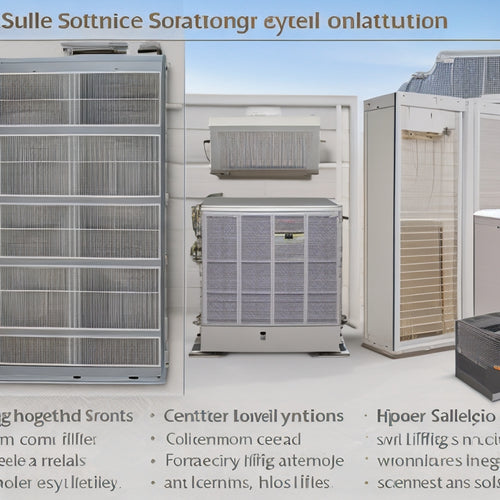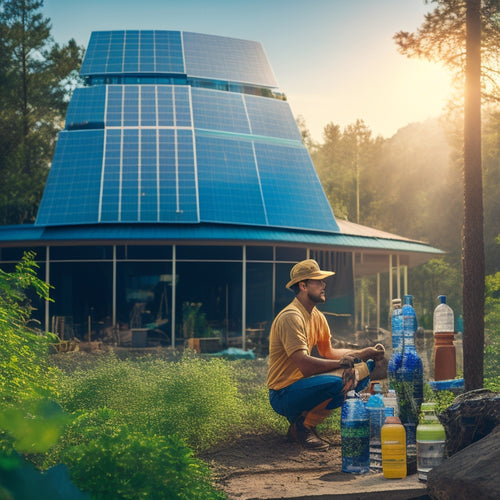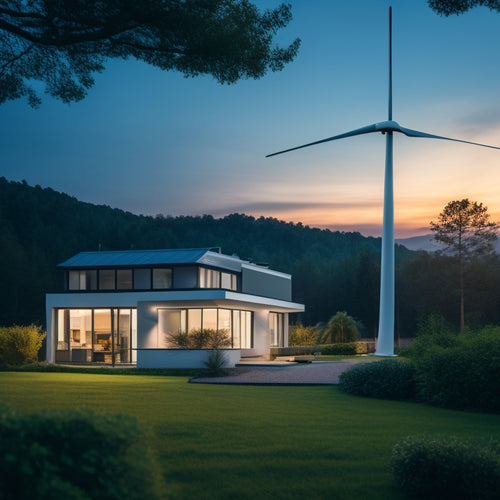
What Are Water Meters for Conservation-Minded Homes?
Share
You're taking an essential step towards a more sustainable future by considering water meters for your conservation-minded home, where every gallon counts. Water meters provide real-time tracking of your water consumption, helping you identify inefficiencies and make adjustments. With smart water meters, you'll receive accurate, remote data transmission, enabling you to detect leaks and optimize your water usage. By installing a water meter, you'll increase your awareness of water usage, adopt conservation practices, and reduce your carbon footprint. Now, explore the benefits of smart irrigation systems and how to install and maintain your water meter to maximize its impact.
Key Takeaways
- Water meters track real-time consumption, helping homeowners identify inefficiencies, detect leaks, and make informed decisions to reduce water waste.
- Smart water meters provide accurate data, enabling homeowners to optimize their water usage, reduce costs, and lower their carbon footprint.
- Installing water meters increases awareness of water usage, encouraging homeowners to adopt conservation practices and eco-friendly solutions.
- Water meters support the adoption of renewable energy sources, such as solar-powered systems, for a more sustainable future.
- Regular inspections and proper installation of water meters ensure accurate readings, prevent waste, and promote overall water conservation efforts.
Understanding Water Meter Technology
With the increasing focus on water conservation, understanding water meter technology is vital for homeowners looking to optimize their water usage.
As we shift to renewable energy sources, such as solar-powered fast charging, it's essential to monitor our water consumption as well.
You'll likely encounter two primary types of water meters: analog and digital.
Analog meters use a dial or series of dials to display water consumption, typically measured in gallons or cubic feet. These meters require a visual reading to track usage.
Digital meters, on the other hand, use electronic sensors to measure water flow and display consumption digitally. They often provide more accurate readings and can transmit data remotely.
Understanding the differences between these technologies will help you make informed decisions about your water meter installation, ensuring you're equipped to monitor and manage your water usage effectively.
Benefits of Smart Water Meters
Now that you're familiar with the basics of water meter technology, let's investigate the benefits of smart water meters, which take monitoring and managing your water usage to the next level.
With real-time tracking, you'll have instant access to your water consumption data, enabling you to identify areas of inefficiency and make adjustments on the fly. This level of transparency leads to significant cost savings, as you'll be able to detect leaks and anomalies before they become major issues.
By adopting renewable energy sources like solar power for EV charging stations sustainable transport systems, homeowners can further reduce their carbon footprint.
Additionally, smart water meters provide detailed observations into your water usage patterns, equipping you to make informed decisions about your consumption habits.
How Water Meters Promote Conservation
By the time you've installed a water meter, you're already taking an important step towards conservation.
You're now more aware of your water usage, which is vital in identifying areas for improvement. With real-time data on your water consumption, you can pinpoint leaks and inefficient appliances, and take corrective action.
This awareness enables you to adopt conservation tips, such as fixing leaky faucets, using low-flow showerheads, and optimizing your irrigation system.
Furthermore, understanding the significance of solar-powered systems in reducing energy costs and carbon emissions can inspire you to investigate similar eco-friendly solutions for your water usage.
Smart Irrigation Systems Explained
Take control of your outdoor water usage with smart irrigation systems, which step in to optimize your watering schedule and eliminate wasteful practices.
These systems use advanced technology to guarantee your lawn and garden receive the right amount of water at the right time. By adopting renewable energy sources, like solar power, to fuel your irrigation systems, you can considerably reduce your carbon footprint and contribute to a sustainable future renewable energy future.
Additionally, investing in energy-efficient solutions can lead to substantial cost savings over time.
With features like:
- Moisture sensors that detect soil moisture levels and adjust watering schedules accordingly
- Drip irrigation that delivers water directly to the roots, reducing evaporation and runoff
- Weather monitoring that skips watering during rainfall or high winds
- Real-time monitoring and notifications to keep you informed of your water usage
you can be confident that your outdoor space is being watered efficiently and effectively.
Water Meter Installation and Maintenance
Every few months, you'll want to inspect your water meter to verify it's functioning accurately and efficiently. This includes checking for any signs of damage, corrosion, or leaks. Proper installation is also essential, as it guarantees accurate readings and prevents water waste. The installation process typically involves connecting the water meter to the main water line, securing it to the ground, and programming it according to the manufacturer's instructions.
| Water Meter Types | Installation Process |
|---|---|
| Mechanical | Connect to main water line, secure to ground |
| Ultrasonic | Program according to manufacturer's instructions |
| Magnetic | Confirm proper alignment with water flow |
Frequently Asked Questions
Can I Install a Water Meter Myself or Do I Need a Professional?
You can attempt a DIY installation, but it's recommended to hire a professional for accurate and hassle-free setup, ensuring you get reliable water usage data and avoiding potential plumbing issues.
How Often Should I Check My Water Meter for Accuracy?
You're wise to monitor your water meter's accuracy; consider the case of the Smiths, who caught a hidden leak by checking their meter readings monthly, saving 10,000 gallons of water! You should check yours every 2-3 months to guarantee precise water usage tracking.
Are Water Meters Compatible With Well Water Systems?
You'll be happy to know that well water meters are available, but you'll need to evaluate specific installation requirements, such as piping compatibility and flow rate measurements, to guarantee accurate readings and ideal performance.
Can I Use a Water Meter to Detect Leaks in My Pipes?
You can use a water meter to detect leaks in your pipes, promoting water efficiency and saving you money. By monitoring your usage, you'll identify unusual patterns, pinpointing hidden leaks, and ensuring freedom from wastefulness and surprise bills.
Are Water Meters Required by Law in All States?
You're wondering if water meters are required by law everywhere. The answer is no, water meter regulations vary by state, and you'll need to check your state's compliance rules to determine if installation is mandatory or not.
Related Posts
-

Why Solar HVAC Filters Revolutionize Home Energy Efficiency
By adopting solar HVAC filters, you're shifting your home's energy reliance from fossil fuels to clean, renewable sou...
-

What Tax Deductions Apply to Sustainable Building Materials?
You can claim various tax deductions for sustainable building materials, thanks to over 40 federal tax incentives sup...
-

10 Grid-Tied Wind Power Systems for Modern Homes
You're looking for a grid-tied wind power system to utilize wind energy for your modern home. Here are ten options to...


